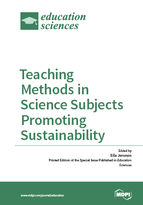Teaching Methods in Science Subjects Promoting Sustainability
A special issue of Education Sciences (ISSN 2227-7102).
Deadline for manuscript submissions: closed (30 September 2016) | Viewed by 115838
Special Issue Editor
2. Adjunct Professor, Faculty of Educational Sciences, University of Helsinki, 00014 Helsinki, Finland
3. Adjunct Professor, Faculty of Education, University of Lapland, FI-96101 Rovaniemi, Finland
Interests: education; teacher education; environmental education; sustainable development education; health education
Special Issues, Collections and Topics in MDPI journals
Special Issue Information
Dear Colleagues,
In the new Transforming of our world, the 2030 Agenda for Sustainable Development has stated that all learners acquire the knowledge and skills needed to promote sustainable development (United Nations, A/RES/70/1, 2015, 17). Consequently, and also with the great proliferation of knowledge and the rapid changes in the field of Science and Technology, it is important to develop students' capacity for self-direction and self-growth. To meet students' needs, teachers should use different teaching approaches. A special issue of Education Sciences welcome all articles discussing work methods in Science subjects, in relation to students' competence and learning outcomes. Articles can discuss both conventional and new methods through which sustainability can be promoted and what kinds of problems and challenges teachers and students meet during teaching, studying, and learning processes. Articles can be review or empirical research.
Dr. Eila Jeronen
Guest Editor
Manuscript Submission Information
Manuscripts should be submitted online at www.mdpi.com by registering and logging in to this website. Once you are registered, click here to go to the submission form. Manuscripts can be submitted until the deadline. All papers will be peer-reviewed. Accepted papers will be published continuously in the journal (as soon as accepted) and will be listed together on the special issue website. Research articles, review articles as well as short communications are invited. For planned papers, a title and short abstract (about 100 words) can be sent to the Editorial Office for announcement on this website.
Submitted manuscripts should not have been published previously, nor be under consideration for publication elsewhere (except conference proceedings papers). All manuscripts are thoroughly refereed through a double-blind peer-review process. A guide for authors and other relevant information for submission of manuscripts is available on the Instructions for Authors page. Education Sciences is an international peer-reviewed open access monthly journal published by MDPI.
Please visit the Instructions for Authors page before submitting a manuscript. Submitted papers should be well formatted and use good English. Authors may use MDPI's English editing service prior to publication or during author revisions.
Keywords
- subject content knowledge
- scientific skills
- student's beliefs
- student's motivation
- students’ self-regulation
- education for sustainable development
- environmental education
- health education






